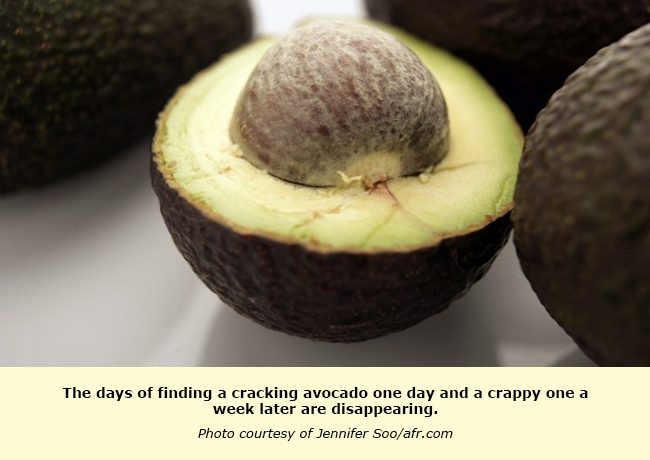Harry Debney, the chief executive of market darling Costa Group, has heard all the gags about smashed avocado and Millennials.
But Tuesday’s share price surge at Costa – up 10 per cent to a record high of $6.88, taking its 12-month gain to 79 per cent – is no joke.

Investors were quick to latch on to the company’s upgrade in full-year 2017-18 guidance, with profit now set to grow 25 per cent in the full year, up from previous guidance of 20 per cent growth.
While Costa Group’s 15.4 per cent rise in net profit for the December half was driven by a bumper citrus crop and strong sales of tomatoes (particularly the snacking varieties), the market is clearly excited about the prospects for Costa’s avo business.
Debney says the avocado boom has now moved beyond the cafes and restaurants, and consumers use the fruit in a wider variety of meals.
A big part of the popularity can be attributed to an improvement in the quality and consistency of fruit being supplied by growers like Costa, and sold by retailers.
The days of finding a cracking avocado one day and a crappy one a week later are disappearing.
Big gains
Revenue from avocados surged 47 per cent during the half, but given Costa’s harvest of the stone fruit is weighted towards the second half of the financial year – it accelerates in February – the big gains will come in the June half, and the 2019 financial year.
Debney, with the help of Macquarie Agricultural Funds Management, has so far pumped $110 million into making avocados the fifth pillar of Costa Group, joining berries, mushrooms, tomatoes and citrus fruits.
On Tuesday he announced two more deals, including the acquisition of Coastal Avocados, on the mid-north coast of NSW, and a deal to buy the Burness farm in Mareeba, on the Atherton Tablelands in Queensland.
Costa now has avo farms across four regions and three states, which means Debney is closer to achieving his goal of providing product across 52 weeks of the year; the Coastal deal will extend Costa’s avocado growing season to 10 months, from February to December.
Debney says he’s about two-thirds of the way through the process of building up the avocado business, and there will be more deals to come. Debney wants to get from about 680 hectares of plantings at present to about 1000 hectares – and he wants to be No.1 in the market.
He says farm valuations are firmer now that the avo boom is in full swing – and vendors are aware Costa is on the hunt for top-quality farms – but Macquarie’s support means Costa gets extra eyes in the due diligence process, and funding to grow the avocado business without crimping growth in the rest of the business.
Expansion goals
This is particularly important given the company is also undertaking major projects in mushrooms and berries, and would like to expand further in citrus via acquisitions.
Costa is also expecting a boost in the 2018-19 financial year from its Chinese operations, where it is growing blueberries (which the Chinese can’t get enough of) as well as raspberries and blackberries (which the locals are less sure about at this stage).
To some extent Costa is still feeling its way here. While plantings for 2017-18 were completed on time, wet weather proved a real challenge. Costa has learnt its lesson though, and preparatory groundwork for 2018-19 plantings is getting under way now – well ahead of the next wet season.
One interesting aspect of this expansion is the role that Costa is playing in “transforming” the Chinese villages where its operations are located.
Not only has Costa’s arrival created a double source of revenue – the villages get paid as landlords and the villagers get paid as workers – but Costa is also working to lift safety standards to match those in Australia.
Source: Financial Review
